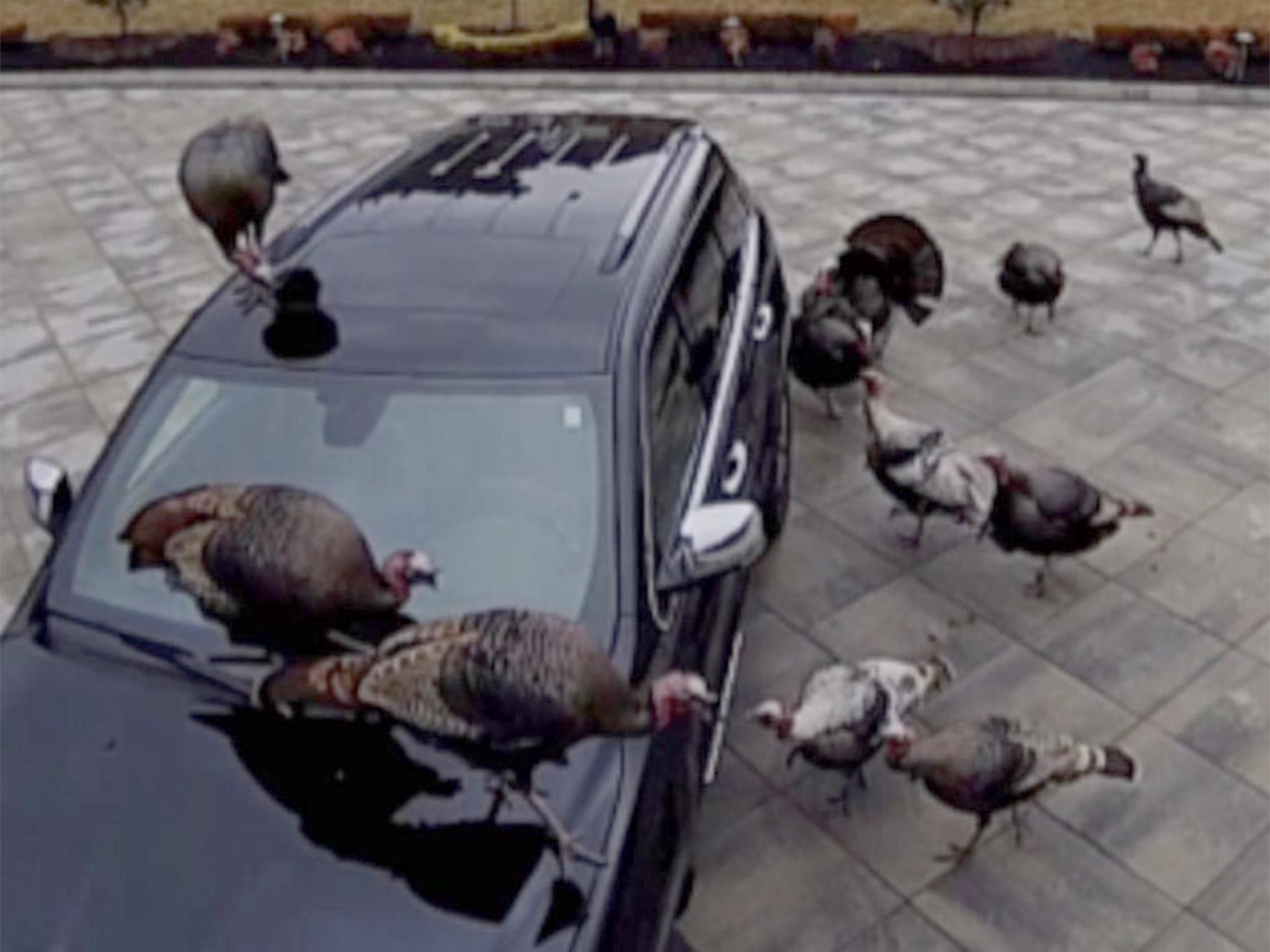Wild turkeys invade US town two weeks before Thanksgiving
Arrival of the birds has split opinion amongst residents in New Jersey town

There was a time when Don Kliem enjoyed feeding sunflower seeds and millet to the wild turkeys that wandered near his ranch-style house in this coastal town about 75 miles south of New York.
“But then they got very bold,” the 81-year-old said. “They would knock on the door — peck on it to get our attention.”
There would be no more snacks.
The turkeys amble in large groups across roads, stubbornly unaffected by a chorus of car horns. They perch on rooftops, make themselves at home in backyards and peck at their feathered reflections in shiny car bumpers.
Some have declared them a menace.
Macy's Thanksgiving Day Parade takes place in New York
Show all 15In recent days, the bold turkeys of Toms River are having a pre-Thanksgiving celebrity moment. While the threat they present is a source of spirited debate in this township of more than 95,000 residents, there is little doubt among neighbours that their numbers seem to have jumped this autumn.
The wild turkeys have become so entrenched that they have even drawn the ire of a professional baseball player, Todd Frazier, who helped his hometown Toms River team win the 1998 Little League World Series.
“They have come close to harming my family and friends, ruined my cars, trashed my yard and much more,” Mr Frazier, a former third baseman for the New York Yankees and New York Mets, wrote on Twitter. He emphasised his point with a photo of 10 turkeys standing on and near a black SUV.
A spokeswoman for Toms River said Mr Frazier sent the same photo to township officials in March, when he first complained that the birds had overrun his neighbourhood in the North Dover section of town.
Mr Frazier, who is now a free agent, could not be reached for comment.
The infiltration of wild turkeys into suburban neighbourhoods is not unusual. In autumn, the birds are drawn to open, grassy fields near wooded areas that provide a ready supply of water, insects and acorns. Most nuisance turkey issues can be traced directly to residents providing food handouts to the animals or having well-stocked bird feeders, said Mitchell Blake, a biologist with the National Wild Turkey Federation.
“They multiply so much,” said Frank Konopka, a nine-year resident of Holiday City, a residential community for people over 55.
As more than two dozen turkeys, most of them covered in dark brown feathers and standing more than 2-feet-tall, meandered through his backyard, he added: “They peck your cars. They go to your window, and they bother your animals.”
The media attention, fuelled by Mr Frazier’s request that the governor take action to address the birds, has made Holiday City the target of more than a few good-natured jokes.
“Friends from all over are calling me, saying, ‘I hear you have attack turkeys?’ It’s crazy,” said Amalia Pace, 67. She lived for 50 years in Brooklyn, New York, and said she enjoys the sight of wild turkeys — a bit of “country living.”
“They don’t bother anybody,” she added.
Wild turkeys that adapt to urban or suburban areas can become aggressive towards humans, especially during spring mating season, according to the US Department of Agriculture.
But John Jenkins, a trustee with the Holiday City homeowners’ association, insists that reports of human-versus-turkey tension in Toms River have been vastly overblown.
Yes, there are dozens of turkeys with a taste for wanderlust. But he said they are neither aggressive nor terror-inducing.
“I had 45 turkeys on my front lawn,” Mr Jenkins said. “I walked straight into them, and they tried to run away. Never once did they come after me or attack me.”
Statewide, there are an estimated 20,000 to 23,000 wild turkeys, and hunters kill about 3,000 birds each year, according to the state Department of Environmental Protection.
A spokeswoman for Toms River, Stacy Georgaklis, said it was illegal for animal control officers to interfere with a turkey unless it was sick or injured. The state Division of Fish and Wildlife on Wednesday began the process of luring the birds with corn and using a net to trap and relocate them.
Officials in New York City have repeatedly utilised a similar trap-and-release method in their effort to rid the grounds of Staten Island University Hospital of the hundreds of turkeys that roost there.
Several hundred were moved between 2015 and 2017, but the problem has persisted; a representative for the local councilman, Steven Matteo, said authorities were awaiting approvals from the state to trap hundreds of additional birds and bring them to an animal sanctuary in upstate New York.
“It is incumbent upon the state agencies that govern the treatment of wildlife to come up with a humane plan to either safely remove invasive animals or lessen their impact on communities, because this isn’t going to just go away,” Mr Matteo said in a statement. “So, my advice to Todd Frazier: Be persistent.”
The turkeys of Toms River do have their defenders.
Vincent Landolfi Jr said he became so agitated by what he said is a misrepresentation of the turkeys’ behaviour that he pushed back online. “EVERYONE STOP BLOWING THIS OUT OF PROPORTION!” Mr Landolfi, 61, wrote in a post on Tuesday morning. “No one that we know is terrified, let alone afraid.”
Still, Mr Landolfi, a former teacher and coach at Red Bank Catholic High School, conceded that the turkeys do possess their fair share of Jersey attitude.
“They’re kind of like don’t-mess-with-me birds,” Mr Landolfi said as several dozen turkeys spread out near his home.
The New York Times
Subscribe to Independent Premium to bookmark this article
Want to bookmark your favourite articles and stories to read or reference later? Start your Independent Premium subscription today.

Join our commenting forum
Join thought-provoking conversations, follow other Independent readers and see their replies